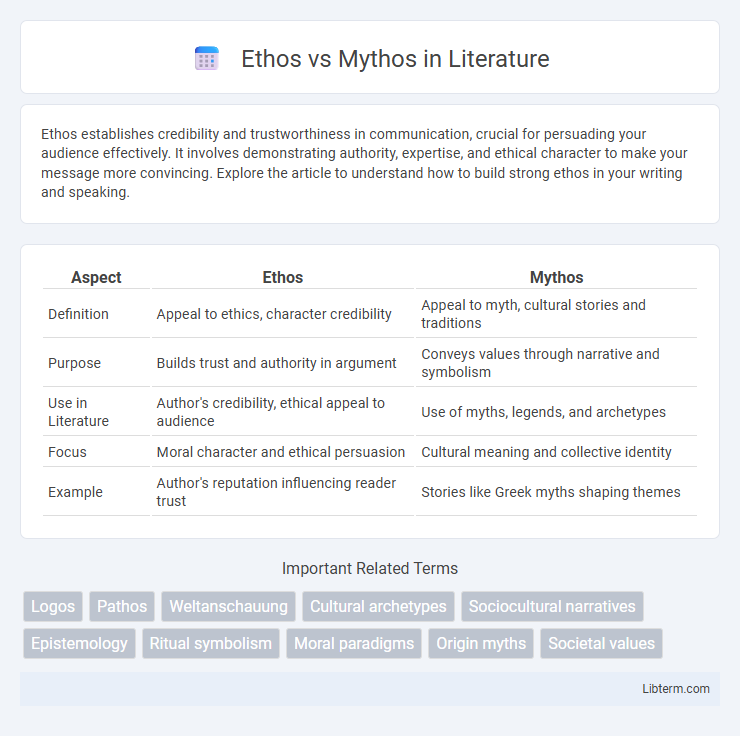Ethos establishes credibility and trustworthiness in communication, crucial for persuading your audience effectively. It involves demonstrating authority, expertise, and ethical character to make your message more convincing. Explore the article to understand how to build strong ethos in your writing and speaking.
Table of Comparison
| Aspect | Ethos | Mythos |
|---|---|---|
| Definition | Appeal to ethics, character credibility | Appeal to myth, cultural stories and traditions |
| Purpose | Builds trust and authority in argument | Conveys values through narrative and symbolism |
| Use in Literature | Author's credibility, ethical appeal to audience | Use of myths, legends, and archetypes |
| Focus | Moral character and ethical persuasion | Cultural meaning and collective identity |
| Example | Author's reputation influencing reader trust | Stories like Greek myths shaping themes |
Understanding Ethos and Mythos: Definitions
Ethos refers to the ethical appeal or credibility of a speaker or writer, emphasizing trustworthiness, authority, and character to persuade an audience. Mythos involves the use of cultural stories, traditions, and shared beliefs to evoke emotional resonance and connect with collective identities. Understanding ethos and mythos requires recognizing ethos as appeals based on ethical character, while mythos harnesses storytelling and cultural narratives to influence perception.
Historical Origins of Ethos and Mythos
Ethos originated in ancient Greek philosophy, particularly in Aristotle's rhetoric, where it represented the ethical appeal and credibility of the speaker. Mythos derives from ancient storytelling traditions, serving as foundational cultural narratives that conveyed communal values and explained natural phenomena. Both concepts shaped early modes of persuasion and cultural identity, intertwining reason and tradition in classical societies.
Ethos: Foundations in Ethics and Character
Ethos represents the foundation of persuasion based on the speaker's credibility, ethics, and character, establishing trustworthiness with the audience. Rooted in Aristotelian rhetoric, Ethos emphasizes moral integrity and expertise, which are crucial for influencing ethical decision-making and leadership effectiveness. Strong Ethos enhances persuasive communication by aligning values and demonstrating accountability, making it essential in fields such as law, politics, and education.
Mythos: Power of Storytelling and Tradition
Mythos embodies the power of storytelling and tradition, shaping cultural identity through shared narratives that transcend time. It harnesses symbolic language and archetypes to convey moral truths, values, and collective memory, reinforcing social cohesion and emotional resonance. This narrative framework influences beliefs and behaviors by embedding meaning in myths, rituals, and legends passed down generations.
Ethos vs Mythos in Cultural Identity
Ethos, grounded in rational principles and ethical values, shapes cultural identity by emphasizing shared beliefs, moral codes, and social norms that define a community's character. Mythos, rooted in storytelling and collective myths, reinforces cultural identity through narratives that convey historical experiences, values, and traditions passed down through generations. The interplay between Ethos and Mythos creates a dynamic framework for understanding cultural identity, blending reason with symbolic meaning to foster a cohesive social group.
The Role of Ethos in Persuasion and Communication
Ethos plays a crucial role in persuasion and communication by establishing the speaker's credibility, trustworthiness, and authority, which enhances the audience's confidence in the message. Effective use of Ethos involves demonstrating expertise, ethical behavior, and goodwill towards the audience, fostering a strong connection that makes arguments more convincing. Unlike Mythos, which appeals to cultural stories and shared values, Ethos centers on the character and reliability of the communicator as the foundation for persuasive influence.
Mythos as Collective Memory and Belief
Mythos serves as the collective memory and belief system that shapes cultural identities through shared stories and legends. It embodies the values, morals, and historical experiences passed down across generations, influencing societal norms and behaviors. As a foundational narrative, Mythos strengthens communal bonds by connecting individuals to a common heritage and worldview.
Interplay Between Ethos and Mythos in Society
Ethos and Mythos operate as dual pillars in shaping societal values and behaviors, where Ethos represents the ethical framework and credibility underpinning communal norms, while Mythos embodies the cultural narratives and symbolic stories that provide collective meaning. Their interplay fosters a dynamic cultural ecosystem where shared myths legitimize ethical standards, and ethical conduct reinforces the power of myths to influence identity and social cohesion. This symbiotic relationship drives the perpetuation of traditions and the adaptation of societal beliefs in response to changing contexts.
Ethos and Mythos in Modern Media
Ethos in modern media emphasizes credibility, authority, and trustworthiness, often established through expert endorsements, verified data, and professional presentation to persuade audiences. Mythos leverages cultural narratives, archetypes, and shared values to evoke emotional engagement and create powerful storytelling that resonates on a collective, often subconscious, level. Both Ethos and Mythos are integral to advertising, social media campaigns, and entertainment, where credibility builds trust and mythic storytelling fosters connection and loyalty.
Choosing Ethos or Mythos: Impact on Interpretation
Choosing Ethos emphasizes credibility and ethical appeal, shaping interpretation through trust and authority in the communicator's character. Opting for Mythos invokes cultural narratives and shared values, influencing understanding by resonating with collective identity and tradition. The impact on interpretation depends on whether the audience prioritizes logical trustworthiness or emotional connection to cultural stories.
Ethos Infographic

 libterm.com
libterm.com